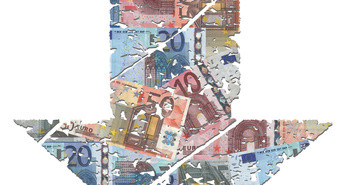Notwithstanding Europe’s extraordinary victory in the Ryder Cup overnight, the single currency has started the new week with a number of fresh concerns. The troika returns to Athens today with the coalition government caught in a tug of war between financial reality and electoral suicide. Also, Spain’s bank stress tests have been deemed not stressful enough, while in France there were mass protests against austerity yesterday. In Asia, weak PMI data out of both China and Australia added to the circumspect mood.
The euro fell to 1.2804 overnight, just below the 200d moving average which has been tested on numerous occasions over recent days. Cable fell to near 1.61, the Aussie also dropped below the 200d moving average overnight to a low of 1.0325. Both the dollar and the Japanese yen were in the ascendancy, as they have been consistently since the Fed announced another injection of QE back in mid-September.
Guest post by Forex Broker FxPro
Looking ahead, currency markets will be focusing closely on Friday’s payrolls figures. Jobs remain the Fed’s top policy priority. This afternoon, the latest ISM manufacturing index is likely to show little change from the weak 49.6 outcome of August. Various countries across Europe will also release their latest manufacturing PMI readings today.
Commentary
The remarkable resilience of commodities. Most of Europe is in recession, Japan is headed that way with America not far behind, and the Chinese economy is really struggling. And yet, commodity prices for the most part are remarkably resilient. Brent crude is up 17% so far in Q3, although this followed a 22% plunge in Q2. The gold price has jumped by 11% in the current quarter, the copper price is up 7% and aluminium is 9% higher. Many agricultural prices such as corn and maize have also surged this quarter. Obviously, there are many explanations for these favourable price movements. Oil has benefitted from heightened geo-political tensions in the Middle East; agriculturals have been boosted by a very severe US drought. Critical for all of these commodities has been the expectation of significant additional monetary stimuli from the world’s major central banks and the desire of investors to own real rather than paper assets in a world where currencies are being debased. Now that the major central banks have fired their monetary bazookas, there is a justifiable concern that commodity prices will struggle should the economic news remain as poor as it has generally been. In addition, traders have accumulated significant long positions in the likes of gold, oil and copper and, as year-end approaches, are likely to shave those positions. The combination of significant macro headwinds and positioning extremes are a resounding warning for commodity bulls. Based on these considerations, those of a contrarian persuasion could do worse than consider shorts in a basket of these major commodities.
RBA should bite the bullet. Much like most other central banks have done recently, the RBA needs to bite the bullet and deliver another easing of monetary policy through a further reduction in the cash rate when policy-makers meet tomorrow. The high currency is an obvious drag on an already struggling economy, the household sector is sitting on a mountain of debt and remains in absolutely no mood to spend, and the global economic prognosis is gloomy. Private sector credit growth is weak, house prices are falling in most major cities and there is a justifiable concern that a worsening terms-of-trade will weigh heavily on national income. Most commentators down under do not expect a rate cut tonight, but in our view the RBA should get on with it. The economy needs a weaker currency, and reducing rates is one way to give forex traders an incentive to drive it lower.



